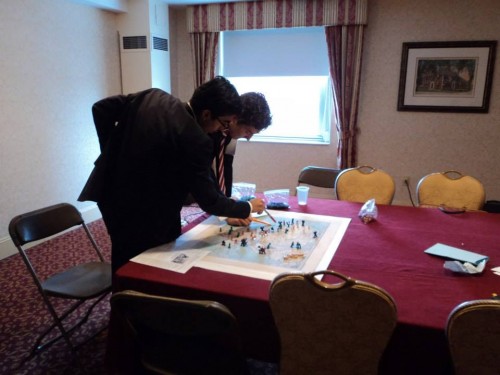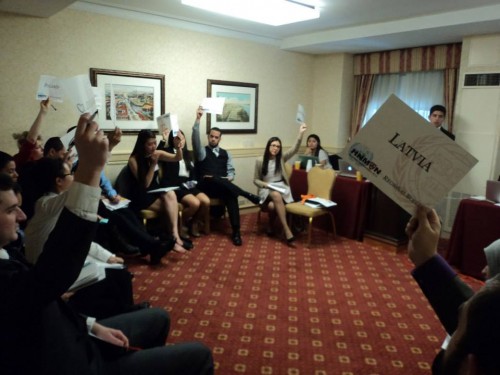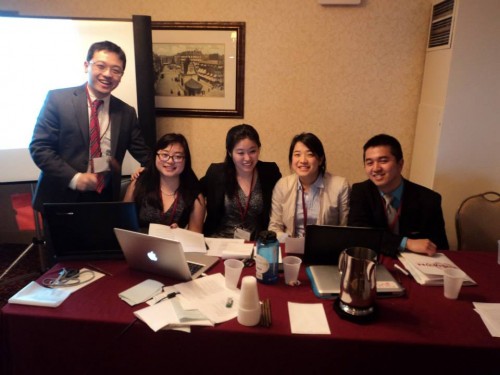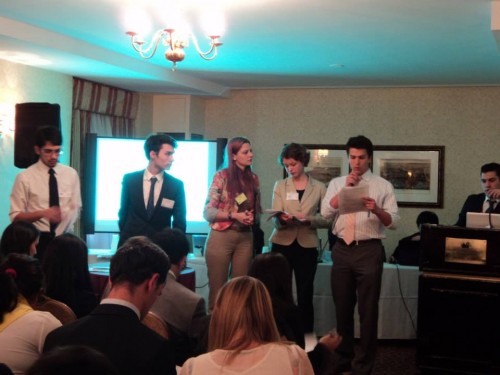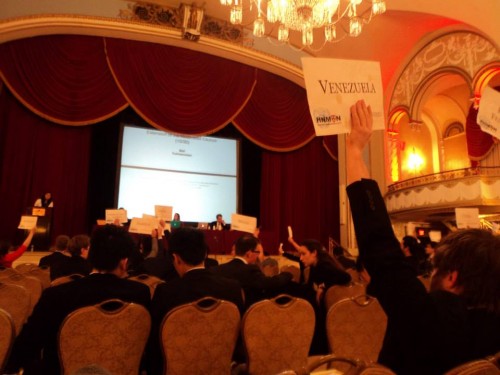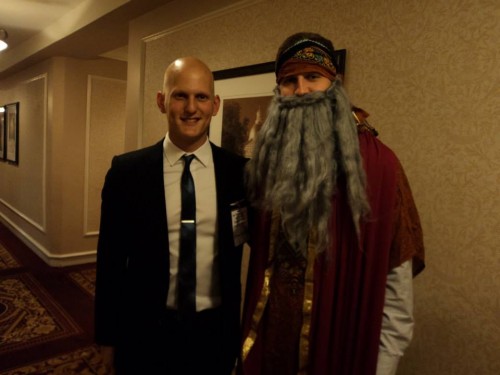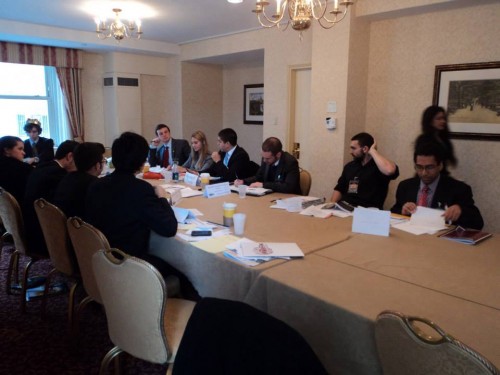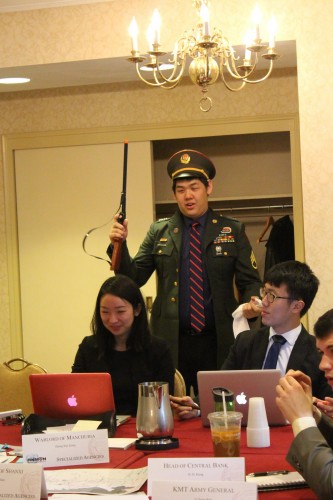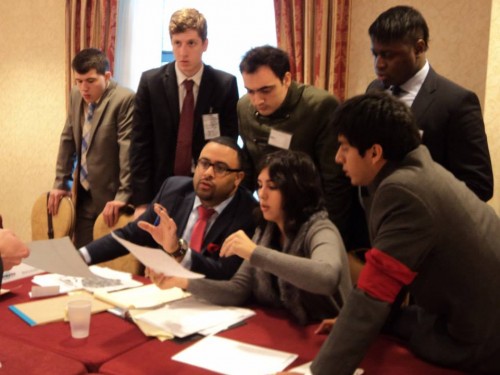International: that’s the word that comes to mind when roaming the halls of Boston’s Park Plaza hotel, where Harvard National Model United Nations takes place every year. For the past sixty years, HNMUN has been one of the most important conferences on the circuit — going so far as to be called the “Super Bowl” of Model UN by the New York Times –- and consistently attracts upwards of 3000 delegates from 70+ countries.
The lobby of the Park Plaza was buzzing when we arrived Thursday night. Delegates were already in their Western Business Attire, shaking hands and getting to know each other. “What committee are you in?”, quickly followed by “What school are you from?” could be heard left and right.. We also heard a number of different languages – from Dutch to French to Portuguese. We heard two delegates, one Spanish and one Italian, communicating with each other in their respective languages.
HNMUN kicked off its conference with Opening Ceremonies, where international delegations draped their flags over balconies and others sang their school songs. Richard Ebright, HNMUN 60’s Secretary General, made an opening speech that called on every delegate there to “make five new friends” by the end of the conference. He also announced the conference’s partnership with The Resolution Project and its 2014 Social Venture Challenge. The Resolution Project – founded by HNMUN alums – is a non-profit dedicated to fostering and promoting youth leadership through collaborative social entrepreneurship. In the Social Venture Challenge, delegates had the opportunity to present on projects that they want to implement in their own home countries and towns to address real problems.
Ebright maintains that breadth of diversity is one of the conference’s main themes. This year, HNMUN is hosting delegates from 73 different countries. On Friday night, one of the social events featured an International Bazaar, in which delegates showcased foods, crafts, and trades from all over the world. HNMUN is also one of the only conferences in the world that features such a variety of delegations, and that is exactly what makes the conference so interesting: we’re witnessing a meeting of several different Model UN circuits, each with their own protocols, conventions, and styles of debate.
HNMUN also stands out for its high level of competition. Sophie Reddering, the Faculty Advisor for the delegation from Utrecht University (Netherlands), says that she met delegates researching and caucusing in the Boston Public Library days before the conference even began. Delegates from Ca’Foscari University, in Venice, Italy, agree: “the competition is really high,” says one delegate, “and you can tell that everyone here is really smart.”
Amidst this atmosphere of high competition, delegates debated a myriad of relevant international issues on Thursday. In the Futuristic UN Commission on Science and Technology for Development, 2025, delegates discussed whether nuclear energy could be considered renewable. In the Court of Guang-Xu, members of the Qing Empire debated over the merits of allowing foreign elements into their country – culminating with a show-stopping entrance by crisis staff dressed up as Empress Cixi, who chastised the delegates for giving away agricultural land to foreigners. This committee was particularly engaging for delegates, with the chair even expecting delegates to refer to him as “Son of Heaven”.
In Ad Hoc – this year simulating the Berlin Conference – delegates discussed the administration of the Suez Canal. Members of the European Community debated in the Special Summit on the Unity of European Nations, 1991 about the creation of a unified foreign policy while still respecting the sovereignty of individual states.
In the League of Arab States, delegates decided to split up their debate topics into the categories of “Human Rights”, “Security”, and “Economy”, since they noted that disagreements in certain areas was preventing cooperation in others – a very real issue in international relations.
In SOCHUM, delegates debated the pronunciation of SOCHUM and discussed the rights and privileges of illegal immigrants. The committee saw many innovative solutions being proposed, such as having NGOs involved in the health aspect of refugee camps, encouraging refugees to become more involved in their camps by instituting a whistleblower system, and more.
Water sanitation was the topic of choice in the World Health Organization where delegates aimed at NGO and corporate involvement and possible solutions to the issue. In the Commission on Sustainable Development, agriculture and ensuring its long-term success was the topic at hand as delegates took an equal parts social and technological approach.
As committee session came to a close Friday, delegates prepared for a cocktail event at which many international delegates would showcase cuisine and culture from their home nations. With live music on hand, the event saw a huge turnout and national pride was at its highest.
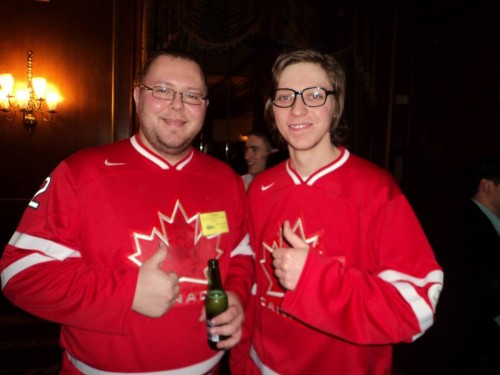
Delegates from the University of Lethbridge, in Alberta, Canada, show off their Canadian pride at the Friday night Cocktail and International Bazaar.
On Saturday morning, committee sessions raced ahead as draft resolutions came to the forefront of debate in the GAs, the regional bodies narrowed down their literature, and the crises in the Specialized Agencies hit full throttle.
In DISEC, large blocs produced very different resolutions on civil war, polarizing the committee and leading to interesting debate from both sides. Elsewhere in the GAs, the Legal Committee and SOCHUM were torn between multiple resolutions while facing very little time for merging an issue that caused great conflict both in committee and in the Park Plaza halls.
The Crisis staff in the Specialized Agencies dealt delegates their toughest cards yet as creative and contentious updates hit every committee. In the Ad-Hoc committee, delegates faced the impending threat of Russian aggression while Tsar Alexander III’s Imperial court provided the pressure as a soft joint crisis emerged.
In the Ikh Khuraldai of the Mongol Empire, the Khan family honour came into question as brothers became foes and the future of the empire came into question from within. Even the empire’s very religion came into contention as the family were torn between Christianity, Islam, and their historical faith. All this culminating in a marriage between one of the Khan’s now Christian sons and a Caliph’s daughter, attempting to harmonise the two beliefs. Harmony was not to be found however as a rebel radicalist called a murderous end to the festivities.
A similar fate befell Tsar Alexander’s court as communism threatened throughout the weekend, but climaxed saturday evening as communist rebels broke in, killing all those who would not swear allegiance to the new communist movement, that is, all but two.
The Court of the Guang-Xu Emperor dealt with much heartbreak Saturday as both the Empress Cixi and the Emperor were killed, leaving the council to fend for themselves in a new era of Chinese governance while the British fight the French in Beijing.
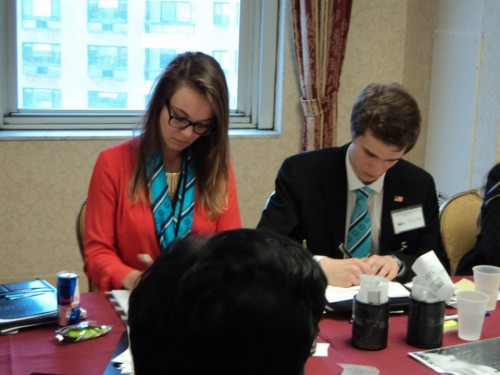
Delegates from the United Netherlands delegation show off their pride in HNMUN’s double-delegate Security Council.
In The Second United Front, China 1936, delegates were given a large amount of flexibility as to where they wanted the committee to go. Ren Jie Teoh, the committee Director, says that he was very open as to what the committee was going to do, and that by Saturday afternoon they were leaning towards military games.
As Saturday drew to a close it was time to prepare for HNMUN 2014’s Delegate Dance. As the night rolled on the Imperial Ballroom came alive with hundreds of delegates showered in confetti.
By the time the last session rolled around on Sunday morning, delegates were exhausted but satisfied with their debate. Closing Ceremonies began with the results of the Social Venture Challenge, where some lucky teams or individuals would receive funding, access to a global network, partnerships, pro bono consulting, and more for their social entrepreneurship projects. According to the Resolution Project representatives, this year’s Social Venture Challenge was an “extraordinary success”, bringing together more than 15 different teams. The winning projects of the Challenge were as diverse as HNMUN itself: ranging from an in-school debate program in Ghana to teach young students debating skills; to a wheelchair basketball initiative in Madison, Wisconsin; to a project that provides entrepreneurship training to petty crime offenders in Nairobi’s prison system to prevent recidivism.
HNMUN also announced the results of its Charity Initiative, which this year chose to support BRAC, an Indonesian-based NGO focusing on development and poverty eradication. This year, HNMUN raised $3,900 for BRAC (shout out to the Historical General Assembly, 1993; the Special Summit for the Unity of European Nations; and the Gabinete Ejecutivo de Isabel Peron for raising the most money in their respective committee categories!)
Finally, it was time for award presentations as delegates from all over the world were recognized for their success over the weekend.
Best International Delegation: Sciences Po Lille
Best Small Delegation: University of Miami
Outstanding Large Delegation: Florida International University
Best Large Delegation: University of Chicago
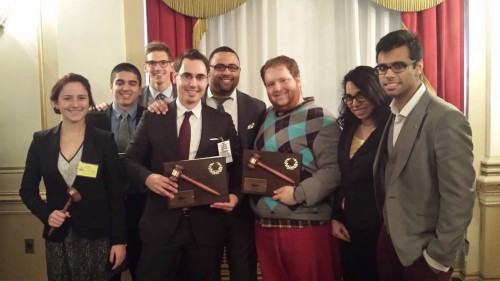
The Head Delegates for the University of Chicago (right) and Florida International University (left) pose for a picture with their Large Delegation awards.
Other schools did remarkably well. From the North American circuit, Yale University, Rutgers, NYU and Columbia all won awards. Canadian schools Carleton University and McGill University also performed well. International delegations also had a particularly strong showing, notably United Netherlands, Universitas Indonesia, and delegations from Peru and Venezuela.
In closing, the sixtieth session of HNMUN was the perfect combination of high-level competition, diplomacy, and the bringing together of numerous Model UN circuits and communities. Most importantly, delegates came away from the conference with one particular line from Closing Ceremonies in mind: “Don’t let anyone tell you that you need to wait to make a difference.”


